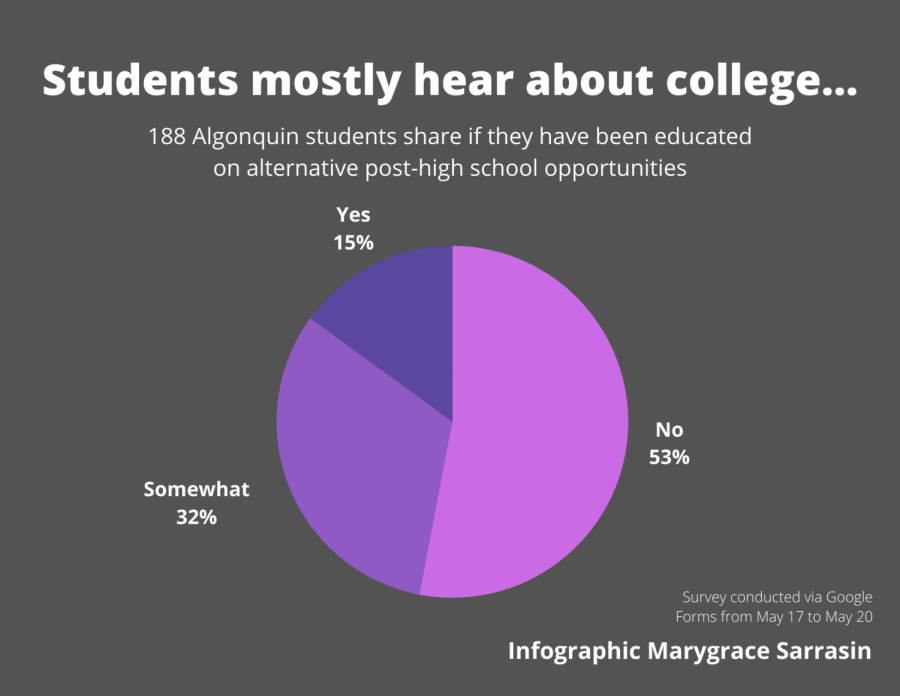Students pressured into college, should be educated on other paths
Staff Writer Marygrace Sarrasin argues that Algonquin students should be educated on post-high school options besides college.
June 17, 2021
It is undeniable that Algonquin seniors have a wide range of talents and interests. However, out of about 350 people in the senior class, over 95% of students plan to attend a two-year or four-year college directly after they graduate. These statistics are very high, but is that a good thing?
In today’s education system, higher numbers appear to be better. This applies to standardized test grades, the amount of AP courses on one’s transcript and the percentage of seniors attending college in the fall. However, this mindset should not always be used. We fail to recognize that college is not for everyone, and this lack of acceptance is negatively impacting students.
The pressure to attend college starts from a young age, before even entering high school. It began with the course selection slideshow in eighth grade, being told what classes to take and what a good grade-point average is. College entered my mind before I was even a freshman, and I have already begun to choose my courses based on what colleges would like to see.
When high school began, it did not take me long to realize that the expectation was for me to attend a four-year college. The college-based guidance meetings, the banners in the CRC, and the university posters in classrooms all tell us what we should be doing after we graduate high school.
According to a Harbinger survey of 188 students conducted by Google Forms from May 17 to 19, 15% of respondents feel educated about alternative post-high school opportunities. This leaves 85% of respondents feeling somewhat informed or not informed at all. Students cannot make decisions for our futures if we are only fully informed about one option.
In this survey, one anonymous respondent stated, “There were meetings and things you could go to to learn about the military and other options, but in class, teachers only ever talked about college.” Students are presented with information about college, but they have to go out of their way to learn about alternative choices.
According to this survey, 62% of students feel pressure to attend college from family, and 48% feel pressure from Algonquin faculty.
Senior Annabella Ferraiuolo has faced pressure, comparison and judgement from her family and school community. As she looks forward to attending California State University for film and dance, Ferraiuolo said planning for college was not easy.
“[Algonquin] is such a ‘you have to go to college’ environment, and I feel like that needs to be changed,” Ferraiuolo said. “I just remember in sophomore year doing those guidance workshops about planning for your future, and it was always about college. I feel like they could have done it differently so it is more about what else you can do, not just necessarily going to a four-year college.”
Algonquin’s college process leaves students like Ferraiuolo and many other students, including myself, feeling uneducated about other paths. When I was younger, my friends, family and teachers always talked about college as if it were the only option for our futures. I thought that would change in high school, and teachers would educate us more about other paths. Unfortunately, that was not the case. The talk of college rose, and it is like alternative options do not exist. I have always planned on attending college, but I question if that is only because it is what I have been told to do.
College is by far the most popular route that students take after high school, and it does have numerous benefits. Many students thrive in an academic environment, and college is a great fit for them. According to Northeastern University’s article, “Average Salary By Education Level,” a college degree often leads to a higher-paying job compared to people without a Bachelor’s or Associate’s degree. However, current high school students should not make decisions based on popularity and money.
Algonquin’s students deserve to be taught about alternative futures outside of the typical college path. We are not educated on how to begin a trade career, such as technician or electrician, or how to enlist in the military. Non-degree programs such as cosmetology have also never been mentioned within school. Many people see these career paths as undesirable or a lesser alternative, but for unjustifiable reasons. It is not Algonquin’s place to tell students what career they should pursue.
Algonquin’s students also should not be expected to attend college. It is clear that the unequal spread of information about college has affected students and their futures. If the 95% of students that attend college decreases, there could be a positive adjustment that shows the variety of post-high school futures Algonquin’s students hold.











JD Phythyon • Oct 23, 2022 at 8:42 pm
Couldn’t agree more. It’s too unrealistic to expect everyone to go to college. I mean it’s quite literally given as the only option for a job to many kids. And I’ve known people who went to college and ended up in a job or sector of the economy that didn’t require college education. You have an excellent point, too: it’s not the place of these high schools to tell students what their career should be. High schools should help you decide, not decide for you.